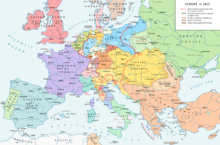Congress of Vienna
The Congress of Vienna of 1814–1815 was an international diplomatic conference to reconstitute the European political order after the downfall of the French Emperor Napoleon I. It was a meeting of ambassadors of European states chaired by Austrian statesman Klemens von Metternich, and held in Vienna from November 1814 to June 1815. The objective of the Congress was to provide a long-term peace plan for Europe by settling critical issues arising from the French Revolutionary Wars and the Napoleonic Wars. The goal was not simply to restore old boundaries but to resize the main powers so they could balance each other and remain at peace. More fundamentally, the leaders of the Congress sought to restrain or eliminate the republicanism and revolution which had upended the constitutional order of the European old regime, and which continued to threaten it.


Quotes
edit- Le congrès ne marche pas, il danse.
- If the Congress does not march, at least it dances.
- Said of the Vienna Congress which assembled in September 1814, and was made the occasion for a prolonged succession of festivities all through the winter, culminating in Prince Metternich’s ball of 7 March, which was rudely interrupted by the news of Bonaparte’s successful landing in the South of France. The Correspondence of the brothers Grimm (Weimar, 1881) gives under the date of 23 November 1814, a reported saying of the day, attributed to Charles Joseph, Prince de Ligne, Le congrés danse beaucoup, mais il ne marche pas. Georg Büchmann, Geflügelte Worte, 19th ed. (1898), p. 528; Edouard Fournier, L'Esprit dans l'histoire, 5th ed. (1883), pp. 427-8; W. F. H. King, Classical and Foreign Quotations, 3rd ed. (1904), no. 1311; see also: "Congres van Wenen (1814-1815) – Betekenis en gevolgen: Zoeken naar een nieuwe 'balance of power' in Europa", Historiek (14 May 2020)
- Thénardier, seated beside a candle in the public room of the tavern, pen in hand, was making out the bill for the traveller with the yellow coat. His wife, standing beside him, and half bent over him, was following him with her eyes. [...] “Twenty-three francs!” cried the woman, with an enthusiasm which was mingled with some hesitation. Like all great artists, Thénardier was dissatisfied. “Peuh!” he exclaimed. It was the accent of Castlereagh auditing France’s bill at the Congress of Vienna.
- Victor Hugo, Les Misérables (1862), as translated by Isabel F. Hapgood (New York: Thomas Y. Crowell & Co., 1887), Bk. III, Ch. 9